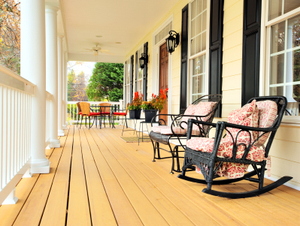Composite vs. Wood Decks in New Hampshire: What Holds Up Best?
When homeowners in New Hampshire plan to add or upgrade >decks & porches, the big question often comes down to material choice: composite or natural wood. Each has its benefits, but they also differ in durability, upkeep, and performance in New England’s tough climate. To make the best decision, it helps to look at how each option holds up through years of sun, snow, and shifting seasons.
Appearance and Aesthetic Appeal
Wood decks bring a warm, classic beauty that many homeowners love. Natural grains and color variations create charm and character, and with proper staining, a wood deck can complement nearly any home style. Composite decking has evolved significantly, with manufacturers now offering realistic wood-look finishes in a variety of tones. While composite doesn’t have the same organic feel, it does provide a consistent appearance without the fading and uneven wear wood can develop over time.
Maintenance vs. Staining Requirements
Maintenance is one of the biggest dividing lines between wood and composite decking. Wood decks require regular staining and sealing to protect against moisture damage and fading. Neglecting this routine can quickly lead to rot, splintering, and costly repairs. Composite, on the other hand, is largely maintenance-free. A simple wash a few times a year keeps it looking fresh, with no sanding, staining, or sealing required. For busy homeowners, composite often wins in this category.
Composite Deck Lifespan in NH
Longevity is another key factor. A well-cared-for wood deck in New Hampshire might last 15 to 20 years, but constant exposure to harsh winters often cuts that number down. Composite decking, by contrast, is designed to resist moisture, mold, and insects, giving it a potential lifespan of 25 to 30 years or more. For those looking for a long-term investment, composite clearly offers greater staying power.
Winter Durability and New England Weather
New Hampshire winters can be especially tough on outdoor structures. Snow accumulation, freeze-thaw cycles, and salt exposure all take a toll on wood. Boards can warp, crack, or split, leaving the surface uneven and unsafe. Composite performs much better under these conditions, resisting expansion and contraction and standing up to icy buildup without splintering. While no deck is completely maintenance-free in winter, composite requires far less attention to remain safe and attractive throughout the season.
Cost Considerations
Cost plays a role in any major home project. Wood decking usually has a lower upfront price, making it attractive for those working within a tighter budget. However, factoring in the ongoing costs of staining, sealing, and potential repairs can make wood more expensive in the long run. Composite comes with a higher initial investment but pays off with lower maintenance and a longer lifespan. For many homeowners, that tradeoff makes sense.
Environmental Factors
For environmentally minded homeowners, the choice can go either way. Many composite boards are made from recycled plastics and wood fibers, offering a sustainable option. On the other hand, responsibly sourced wood is renewable and biodegradable. Both can be eco-friendly choices depending on sourcing and production practices.
Professional Deck Building Guidance
When deciding between composite and wood, it helps to consult with professionals who understand New Hampshire’s climate and building conditions. An expert New Hampshire deck building crew can guide you through the pros and cons, ensuring your investment is built to last and tailored to your home’s style and needs.
Whether you choose the timeless look of wood or the low-maintenance strength of composite, your decision should be based on longevity, budget, and how much upkeep you’re willing to handle. For durable, beautiful decks & porches in New Hampshire, trust us to bring your outdoor vision to life.
Friday, October 10, 2025












